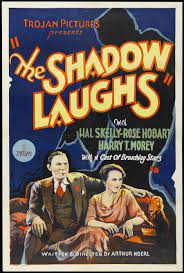
A late-night robbery at the Hancock Bank results in the death of the watchman. One of the thieves is a cashier at the bank who had been embezzling to pay off his gambling debts. When the bank is inventoried, they find that five one thousand dollars bills were taken in addition to the small, more easily passed bills. Later, near an abandoned taxi, the cashier is found murdered, a thousand-dollar bill clutched in his hand.
The city editor at the Daily Journal newspaper sends reporter, Robin Dale (Hal Skelly), to cover the story. At the bank Captain Morgan (Harry T. Morey), with the assistance of detectives Clymer (Harry Short) and Sergeant Owens (John F. Morrissey) are investigating. Also at the bank is the bank manager, Tennant (Walter Fenner) and another cashier, Ruth Hackett (Rose Hobart). Robin tries to impress Ruth while also trying to get information from her on the robbery.
Robin’s friend runs a funeral parlor. While he is there a man comes in and buys a casket. He wants it sent to Jack Bradshaw (Bram Nossen) at the “13 Club”, a local gambling den. After he leaves, Ruth comes in asking about him. Robin then gets a call from the editor sending him to the 13 Club to get a story on a murder there. The gambling den is currently closed due to a police raid the previous week. The dead man turns out to be the missing taxi driver. In his hand is one of the missing thousand-dollar bills.
Soon on the scene is Ruth. The police find out that Ruth’s brother George (Robert Keith) bought the casket. He is also on the outs with Bradshaw because he doesn’t like the fact that Bradshaw is after his sister. George becomes a suspect. Robin, now sweet on Ruth, decides that the police can’t solve the robbery and the murders alone. To help Ruth, he puts himself into the investigation.
“The Shadow Laughs” was released in 1933 and was directed and written by Arthur Hoerl. Hoerl is the one of the guys that brought us “Reefer Madness” 1936. It is a low budget American pre-code murder mystery film. It was produced by Trojan Pictures, a company that made only three films that I know of. This is not your Lamont Cranston Shadow. In fact, there really isn’t any shadow, just a murderer that’s not revealed until the very end. In addition, he only laughs once.
In the early thirties sound was still rather new. This exciting phenomenon gave us some really good movies such as “King Kong” 1933, “Dracula” 1931, and “Frankenstein” 1931. It also gave us a shitload of really bad movies, but since they were talkies, people showed up in droves to watch them. This being one of them. I’ve definitely seen worse so it’s not total crap but there is a lot wrong with it. The plot is rather stringy, and the directing and editing are choppy at best, which makes it difficult to follow what’s going on. The Undeveloped and confusing script, along with the unfunny banter makes the movie rather uninteresting.
The only interesting things about the movie are that Rose Hobart’s acting is decent and it is Cesar Romero’s first film.

